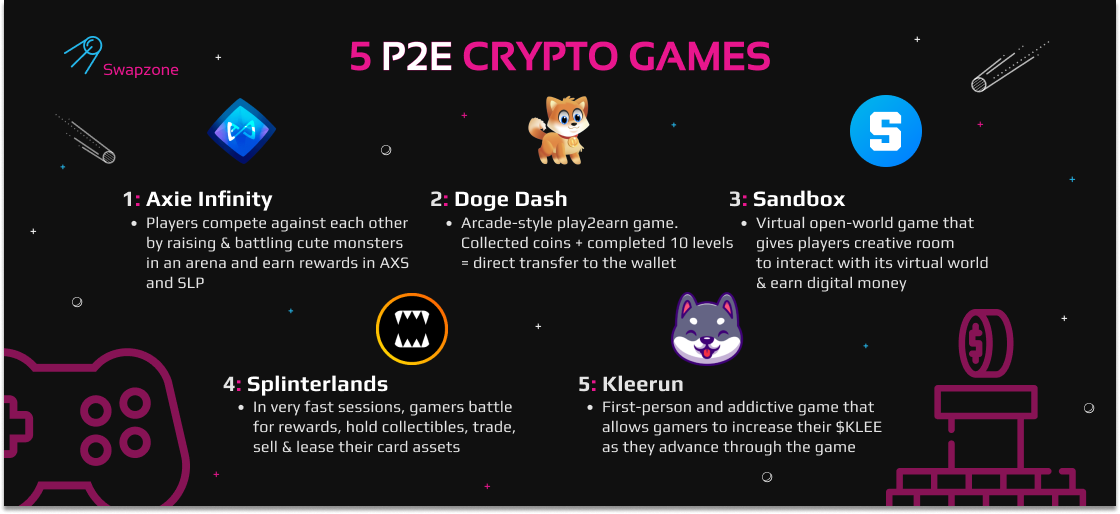Play to earn rewards: a easy way to earn while having fun in your favorite games
Play to earn rewards: a easy way to earn while having fun in your favorite games
Blog Article
Exactly How Play-to-Earn Rewards Are Transforming the Gaming Experience
The introduction of Play-to-Earn rewards notes a significant development in the pc gaming landscape, changing the emphasis from simple enjoyment to real economic participation. This improvement invites gamers to spend not just their time yet also their funds, promoting a feeling of possession and much deeper involvement within video game ecosystems. As varied demographics welcome these possibilities, brand-new neighborhoods emerge, obscuring the lines between recreation and investment. Yet, this change increases essential inquiries regarding sustainability and the future of video gaming. What implications could this have for the sector and its players?

Development of Video Gaming Designs
The landscape of pc gaming has actually undertaken a substantial makeover over the years, developing from conventional pay-to-play models to a lot more ingenious frameworks that prioritize customer engagement and monetization. Initially, video games were mostly sold as standalone items, calling for upfront repayments for accessibility. This model, while effective in creating income, frequently minimal gamer communication and community building.

In recent years, the increase of blockchain technology has presented play-to-earn systems that basically alter pc gaming dynamics. These models not just offer a system for gamers to gain incentives yet also democratize the gaming economic climate, permitting individuals to own in-game properties. This advancement reflects a broader fad in the direction of community-driven experiences, where developers and gamers collaborate fit the pc gaming landscape, ultimately redefining just how worth is viewed in the gaming market.
Benefits of Play-to-Earn Systems
Unlocking brand-new avenues for player involvement, play-to-earn systems provide a series of advantages that basically improve the pc gaming experience. These systems equip gamers by offering substantial rewards for their time and initiative, promoting a feeling of possession and financial investment in the video game. This intrinsic inspiration drives gamers to engage even more deeply, discovering game technicians and neighborhoods that they could otherwise neglect.
Moreover, play-to-earn designs equalize pc gaming by leveling the playing field. Gamers from various histories can profit from their abilities and creative thinking, allowing brand-new entrants to experience economic advantages that were typically reserved for developers and authors. This shift motivates a more diverse gamer base, improving the video gaming community with varied viewpoints and experiences.
Additionally, play-to-earn systems promote community structure, as players team up and contend within decentralized atmospheres. This interaction grows social links that enhance enjoyment and retention, as players feel a feeling of belonging.
Last but not least, these systems can bring about enhanced durability for video games, as constant player involvement often converts into continual interest and investment in future models or developments, making certain a vivid pc gaming landscape.
Financial Effect on Players
Play-to-earn systems not just improve gamer interaction yet additionally have significant economic implications for people involved. These systems important link allow players to monetize their time and abilities, changing video gaming from a pastime into a practical revenue source. As players make copyright or in-game assets that can be traded or marketed in real-world markets, they acquire financial rewards that can considerably influence their personal economic climates.
The financial version cultivates a new age of entrepreneurship, as gamers can spend in numerous pc gaming ecological communities or establish strategies to optimize their incomes. This potential for income generation attracts a diverse demographic, including those in areas with restricted work opportunities - play to earn rewards. Numerous players are currently seeing pc gaming not just as home entertainment but as a pathway to economic empowerment.
Nonetheless, it is important to identify the volatility related to cryptocurrencies and the possibility for market changes to affect revenues. Gamers should browse these dangers while balancing their pc gaming and financial tasks. On the whole, the financial influence on gamers is extensive, reshaping their partnership with video gaming and opening methods for riches creation in a progressively electronic economy.
Neighborhood Structure in P2E Games

Players in P2E environments regularly create guilds or alliances, creating networks that promote source sharing, strategic planning, and common support. These teams commonly take part in cooperative objectives or competitions, better enhancing their bonds and improving the general video gaming experience. Furthermore, community-driven events, such as competitions and social celebrations, serve to unite players, foster camaraderie, and incentivize participation.
Furthermore, developers actively engage with their communities, including responses and suggestions that form video game advancement. This collaborative approach go to this website not just empowers players but additionally makes certain that video games develop abreast with gamer passions, enhancing contentment and lasting engagement. Inevitably, neighborhood building in P2E video games is not simply a feature; it is a fundamental facet that transforms the gaming landscape right into a more comprehensive and interactive atmosphere.
Future Trends in Pc Gaming
The video gaming market's development is poised to embrace a number of transformative try this out trends that will certainly redefine player involvement and experience. One of the most substantial patterns is the integration of fabricated intelligence (AI) to develop more tailored video gaming settings. AI can analyze gamer behavior and choices, allowing designers to customize experiences that resonate deeply with private customers.
Moreover, the arrival of online and increased truth (VR/AR) modern technologies is set to improve immersion, offering players the capability to interact with digital globes in extraordinary ways. This will certainly not just elevate gameplay however also foster social links, as gamers can collaborate and contend in common environments.
Additionally, the increase of blockchain modern technology will certainly continue to affect the gaming landscape, enabling real possession of in-game properties through non-fungible symbols (NFTs) This trend will equip players to trade and monetize their pc gaming experiences, better blurring the lines in between gaming and investment.
Verdict
By integrating economic motivations right into gameplay, gamers are progressively engaged, fostering a sense of ownership and investment in digital settings. As these patterns continue to evolve, the obscured lines in between enjoyment and investment will likely redefine the future of video gaming, shaping brand-new experiences for players worldwide.
Report this page